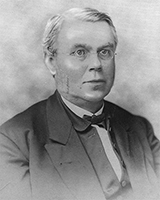 Thomas Murphy
Thomas Murphy
The pastor is appointed to be a living example of the gospel which he preaches.
This places the necessity of his being an eminently godly man in a very strong light. The solemn charge is imposed upon him of demonstrating by his daily walk and conversation the truth and the power of the doctrines of the gospel. From this responsibility no possible argument will release him. The divine law which has been laid down for his guidance is this: “A bishop then must be blameless, the husband of one wife, vigilant, sober, of good behavior, given to hospitality, apt to teach; not given to wine, no striker, not greedy of filthy lucre; but patient; not a brawler, not covetous; one that ruleth well his own house, having his children in subjection with all gravity (for if a man know not how to rule his own house, how shall he take care of the Church of God?); not a novice, lest being lifted up with pride he -fall into the condemnation of the devil.” Moreover, he must have a good report of them which are without; lest he fall into reproach and the snare of the devil.” The reputation for holiness which the pastor is to sustain is here described with some minuteness, that there may be no mistake.
This appointment of the minister to teach by example must be carefully studied. All his other learning will be in vain without it. All other preparation for his office will be lost if this does not receive the chief attention. Of ministers emphatically it may be said that they are Christ s living epistles sent out into the world in order that men might read in them the transforming efficacy of his gospel. To them especially is the direction of Christ given: “Ye are the light of the world. . . . Let your light so shine before men, that they may see your good works and glorify your Father which is in heaven.” To pastors the particular charge is given that they strengthen the Church by their own example: “Feed the flock of God which is among you, taking the oversight thereof, not by constraint, but willingly; not for filthy lucre, but of a ready mind; neither as being lords over God’s heritage, but being examples to the flock.” And this example is to be set by them in all the Christian graces: “Let no man despise thy youth, but be thou an example for the believers, in word, in conversation, in charity, in spirit, in faith, in purity.” In this way they are to illustrate all kinds of good works and to disarm all opposition: “In all things showing thyself a pattern of good works; in doctrine showing uncorruptness, gravity, sincerity, sound speech that cannot be condemned, that he that is of the contrary part may be ashamed, having no evil thing to say of you.” There is no law of the whole pastoral office that is more fully and explicitly enjoined than this.
Those who hold this office are not only to describe to men the effects of religion upon the life, but they are also to show them in their own practice. This is something that can be better understood and will be more deeply felt. Holiness of life, the pure and noble character that is reached by daily communion with God, when seen in the minister, will convince men of the truth and power of the gospel as nothing else short of God’s omnipotent Spirit could do. Men form their opinions of Christianity not so much from what they read in the book of God as from what they read in the book of the lives of its professors. When this book is fair and beautiful, they will be attracted; when it is blurred, they will be driven away. Example will break down opposition and produce conviction when nothing else will. An eminent man of God has said, “Be assured of this, brethren, there is no preaching like the preaching of ministerial sanctity.” Hooker used to say that “the life of a pious clergyman is visible rhetoric;” and Herbert, that “the virtuous life of a clergyman is the most powerful eloquence.” And what will give this sanctity of life but the unction from on high? What but the possession of the very mind of Christ will so purify and ennoble the life as to make it a fit example to illustrate the gospel and attract to the cross? The life of the pastor should be one of such heavenly-mindedness that he would not only bear witness of Christ, but also be a living witness to him; that his example would give a high tone to the piety of the Church; that, in boldness, with the devoted Paul he could say, “Be ye followers of me, even as I also am of Christ.””
